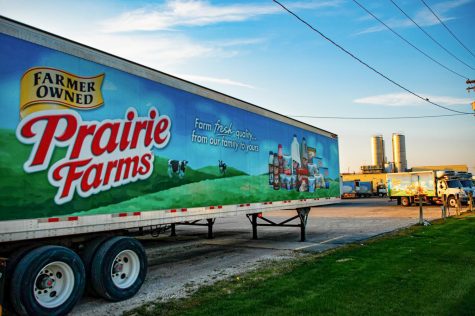Farmers to Families Food Box program likely to change with American Rescue Act
April 9, 2021
At Cusumano & Sons the Farmers to Families Food Box program helped keep the company afloat when the COVID-19 forced most food-related businesses to close.
“It helped keep us and our employees out delivering and working where there would have been a void because the restaurants weren’t open,” Cusumano said. “The USDA box did help a lot with making sure that we kept all our people employed at a full time level.”
The Farmers to Families program is slated to end on April 30, but it appears the program will be replaced with some other form of food purchasing and distribution through the US Department of Agriculture (USDA).
Advertisement

“It’s kind of a wait and see game,” Cusumano said. “My guess is, it won’t be the same program that it is right now, but I would be surprised if they didn’t fund a program with the same intent.”
The American Rescue Plan, which became law on March 11, does not specifically extend the program, but it does include $3.6 billion to fund food purchases, distribution, loans and grants through September of 2021.
“The bill addresses food security challenges presented by the pandemic through programs outside of the Coronavirus Food Assistance Program and the Farmers to Families Food Box program,” according to a USDA press statement.
The food box program was not without its pitfalls.
A review of the program conducted by Harvard found that there was a lack of consistency in distribution contracts which left many geographic areas uncovered. Also, changing regulations led to a decrease in available produce and a focus on low-cost items led to small and mid-size farms being excluded.
Originally, the program accepted bids for three categories of food distribution boxes, with separate bids for fruit/vegetables, meat and dairy.
“They decided to change it to just one box, and the contract specifically states how much fruit and vegetable you have to have in a box, how much meat you have to have in the box, and how much dairy you have to have in the box,” Cusumano said.
Advertisement*
The number of distributors being awarded contracts has also decreased in each round of funding, and in the most recent round, Produce Alliance was the only company awarded a contract covering Illinois, Indiana, Alabama, Wisconsin, South Carolina, New Hampshire and Massachusetts.
“A smaller vendor either has to distribute in a larger area than they’re normally comfortable with, which will do injustice on the distribution side, or you have to partner with somebody that is going to do a larger scale,” Cusumano said. “If you’re partnering with somebody else, there’s more slices being cut out of the pie.”
The Chicago Food Policy Action Council and 45 other organizations signed a public letter in February asking for flexible models for meeting fresh food access, engaging community organizations rather than lowest-bidding distributors, and providing longer term contracts.
It’s unclear whether those issues will be addressed in a new iteration of the food distribution program.
Despite problems, there has still been massive demand for emergency food distribution both from farmers and consumers.
“We still get demand for more communities wanting more boxes than we have access to from the government,” Cusumano said.
Staff reporter Jason Flynn can be reached at jflynn@dailyegyptian.com, by phone at 872-222-7821 or on Twitter at @dejasonflynn.
To stay up to date with all your southern Illinois news, follow the Daily Egyptian on Facebook and Twitter.
Advertisement







